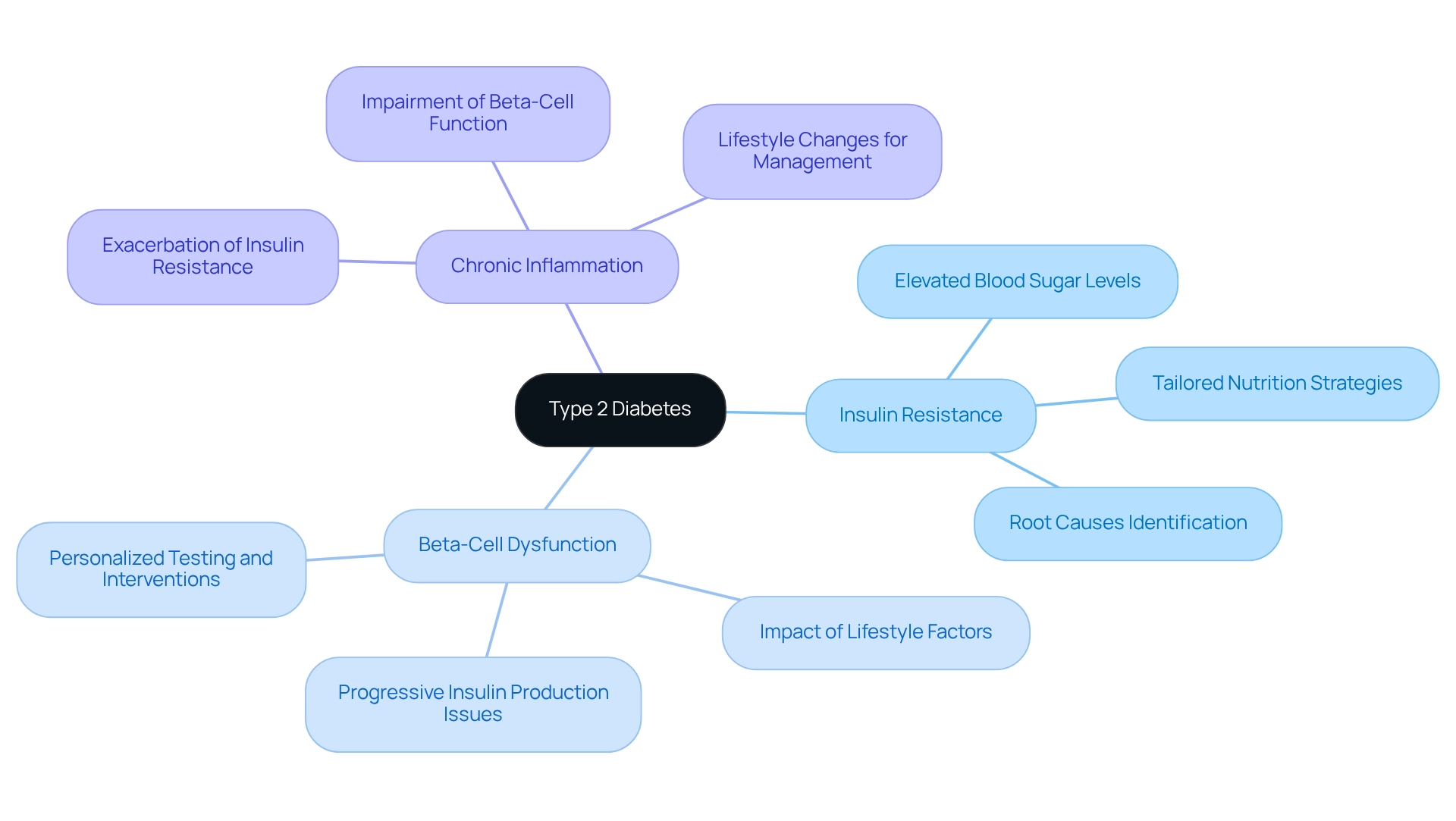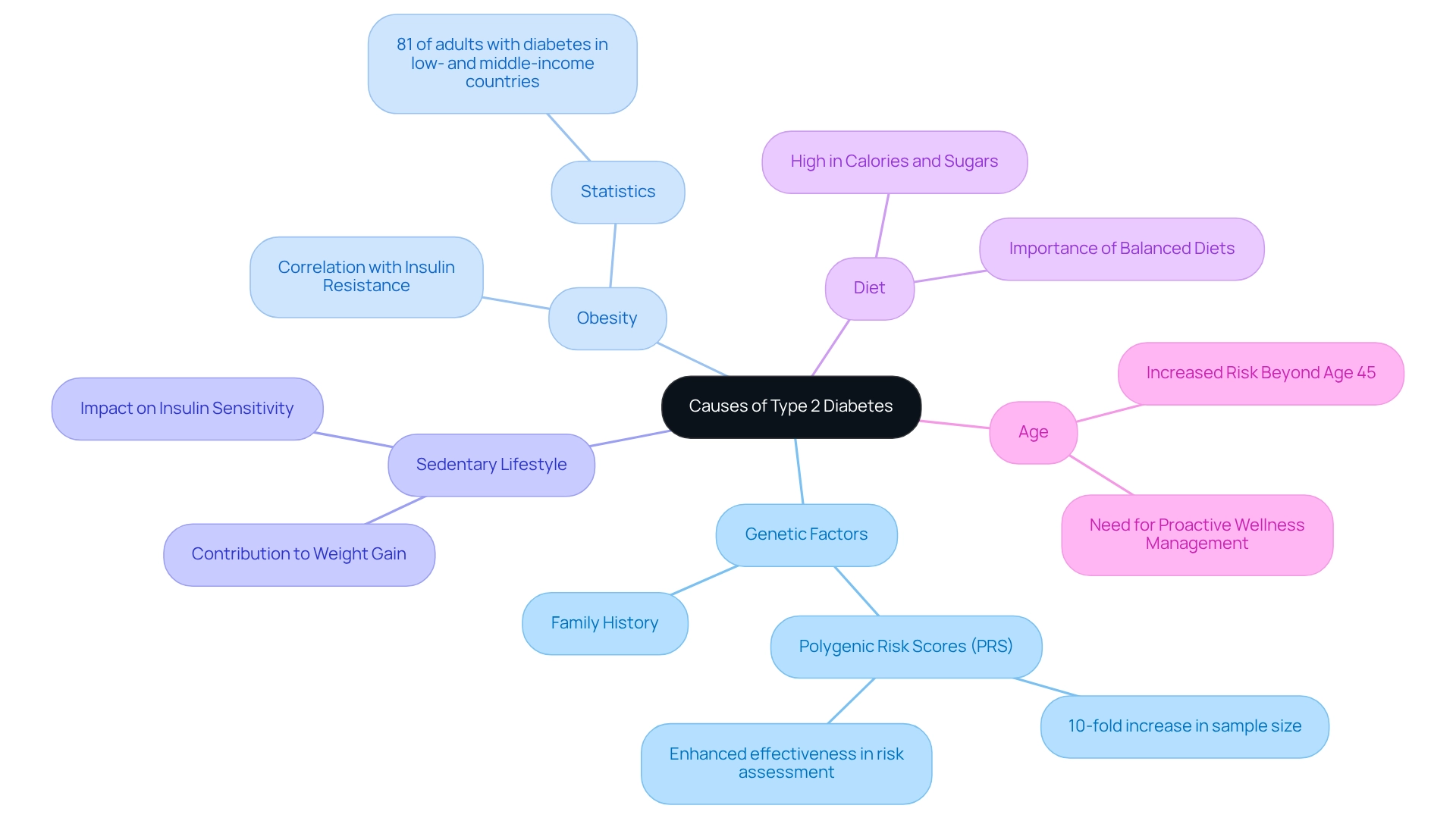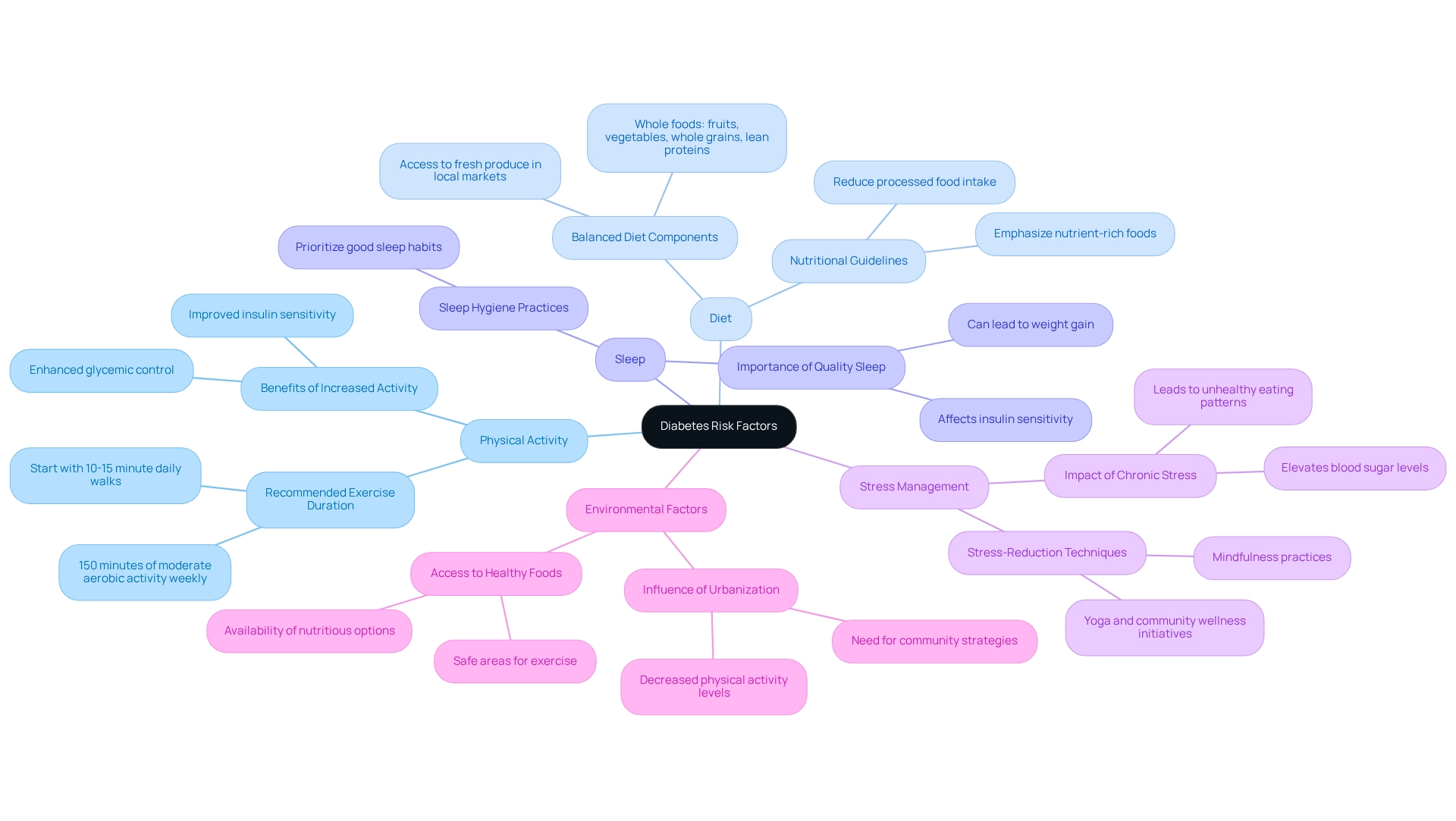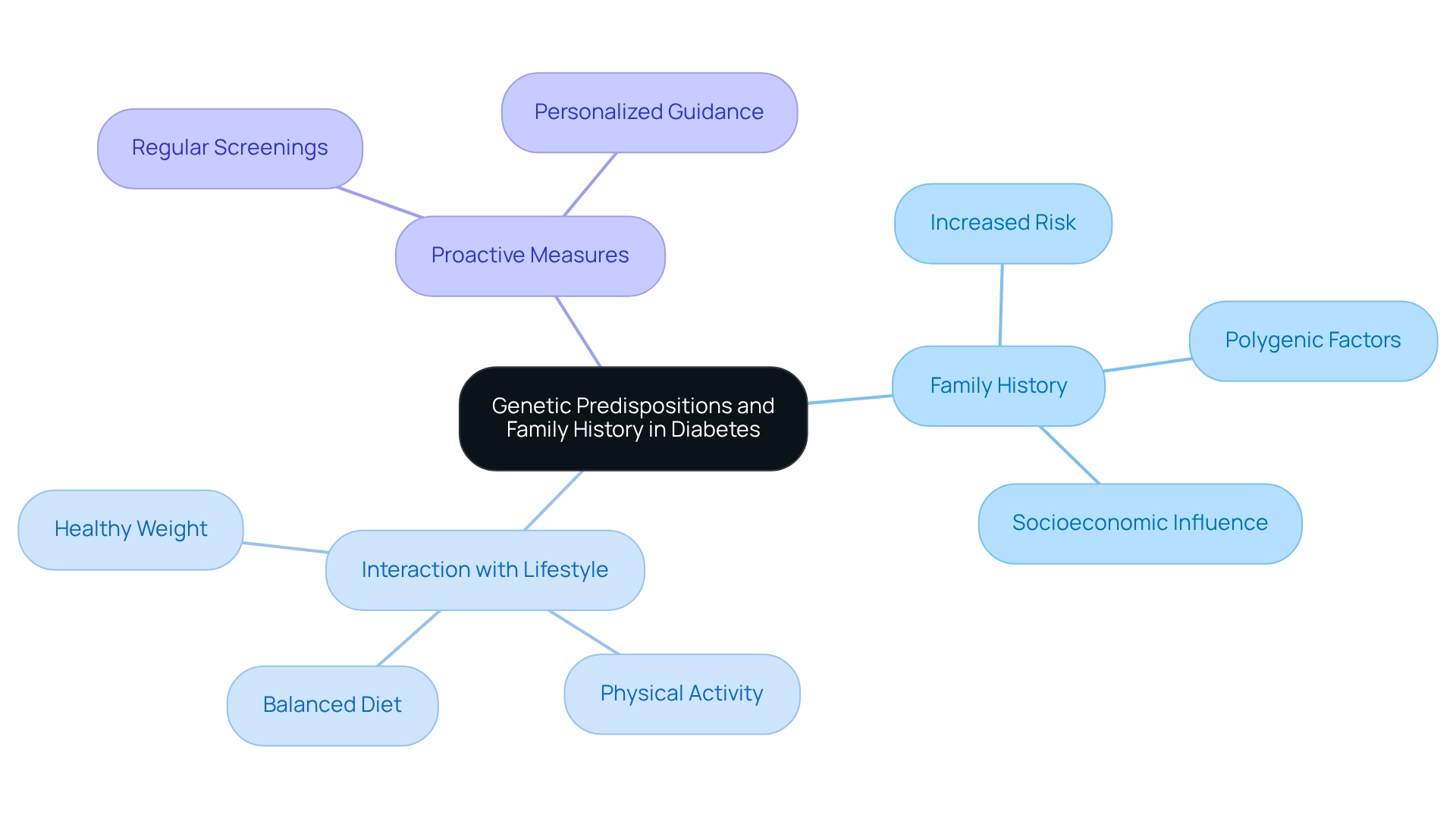Overview
This article seeks to understand the multifactorial causes of Type 2 diabetes, a condition that many individuals face with concern. It emphasizes key factors such as insulin resistance, genetic predisposition, obesity, sedentary lifestyle, and chronic inflammation. It’s important to recognize that these interconnected factors can significantly contribute to the development and progression of the disease.
Many patients find that lifestyle modifications can make a profound difference. By making small, manageable changes, individuals can take charge of their health. Personalized interventions are vital for effective management and prevention, and they can lead to a more fulfilling life.
As you explore this journey, remember that you are not alone. The path to better health is filled with challenges, but with support and understanding, it is entirely achievable. Let’s work together toward a healthier future through the 30-Day Diabetes Reset program, where we can foster positive change and empower each other.
Introduction
In the face of a growing global health crisis, type 2 diabetes emerges as a significant challenge, impacting millions and transforming lives. It’s important to recognize that this condition is characterized by insulin resistance and a myriad of interconnected factors. It is not solely a product of genetics or lifestyle choices; rather, it represents a complex interplay of elements that necessitates a comprehensive understanding.
Dr. Jason Shumard and his team at the Integrative Wellness Center explore the intricate mechanisms behind type 2 diabetes. They delve into everything from genetic predispositions to the effects of obesity and sedentary lifestyles. Many patients find that by addressing the root causes and emphasizing holistic health solutions, they can reclaim their health and well-being.
With alarming statistics indicating a significant number of undiagnosed cases, the urgency for effective management and early intervention has never been more pronounced. Together, we can navigate this journey toward better health, ensuring that individuals feel empowered and supported every step of the way.
Define Type 2 Diabetes: Key Concepts and Mechanisms
Type 2 diabetes mellitus is primarily characterized by insulin resistance—a condition where the body’s cells, especially in muscle, fat, and the liver, struggle to respond effectively to insulin. This resistance leads to increased blood glucose levels, which can significantly impact well-being. It’s important to recognize that individuals facing Type 2 blood sugar issues and hypothyroidism encounter considerable difficulties. Dr. Jason Shumard emphasizes the significance of understanding these mechanisms for effective management and highlights the importance of comprehensive wellness solutions to help reverse these conditions.
Many patients find that the key mechanisms involved in this condition include:
- Insulin Resistance: The inability of cells to respond to insulin results in elevated blood sugar levels, a hallmark of this condition. Dr. Shumard’s functional medicine approach uncovers the root causes of insulin resistance and implements tailored nutrition strategies to combat it.
- Beta-Cell Dysfunction: Over time, the pancreas may struggle to produce enough insulin to counteract the resistance, leading to hyperglycemia. Recent studies indicate that beta-cell dysfunction is progressive and often worsened by lifestyle factors and chronic inflammation. Dr. Shumard underscores the importance of personalized testing and interventions to restore beta-cell function.
- Chronic Inflammation: Inflammatory processes can further exacerbate insulin resistance and impair beta-cell function, creating a vicious cycle that complicates management. By addressing persistent inflammation through lifestyle changes and functional medicine, patients can achieve improved wellness outcomes, particularly by understanding the causes for type 2 diabetes, as complications from this sugar illness can greatly diminish quality of life, making it essential to identify these underlying factors for both prevention and treatment. Understanding these mechanisms is crucial for creating effective management strategies that address the causes for type 2 diabetes. Lifestyle modifications, such as adopting a healthier diet and increasing physical activity, alongside medical interventions, can significantly influence the progression of the disease. With approximately 5,293 children and teenagers diagnosed with Type 2 diabetes, there is an urgent need for early intervention and education to empower patients and enhance health outcomes.
Dr. Shumard, who possesses postgraduate education in functional endocrinology and clinical nutrition, along with his expert team at Integrative Wellness Center, is dedicated to providing personalized guidance and support. For individualized assistance in managing your condition, consider reaching out to Dr. Shumard at 858-564-7081. Schedule your consultation today!
Explore the Multifactorial Causes of Type 2 Diabetes
The causes of type 2 diabetes are multifactorial, encompassing a range of interconnected factors:
- Genetic Factors: A family history of diabetes significantly increases the risk, with certain genetic predispositions identified as key contributors to the disease. Recent research suggests that genetic influences can explain a significant share of the likelihood of developing the condition, emphasizing the value of knowing one’s family health background. For example, a 10-fold increase in sample size in a recent GWAS study has significantly enhanced the effectiveness of polygenic risk scores (PRSs), highlighting the evolving nature of genetic research in understanding the risk associated with metabolic disorders.
- Obesity: There is a strong correlation between obesity and type 2 blood sugar issues, particularly with excess body fat concentrated around the abdomen. This visceral fat is closely associated with insulin resistance, making weight management a crucial factor in preventing the disease. Current statistics show that more than 4 in 5 adults with high blood sugar live in low- and middle-income nations, where increasing obesity rates pose a significant challenge. This connection highlights the necessity for effective strategies to tackle obesity as a way of decreasing the likelihood of developing health issues.
- Sedentary Lifestyle: It’s important to recognize that a lack of physical activity not only contributes to weight gain but also exacerbates insulin resistance. Engaging in regular exercise is essential for maintaining a healthy weight and improving insulin sensitivity.
- Diet: Many patients find that diets high in calories, sugars, and unhealthy fats can lead to obesity and metabolic dysfunction. Nutritional specialists highlight the significance of balanced diets abundant in whole foods to reduce these concerns.
- Age: The probability of developing the second form of the condition rises with age, especially beyond the age of 45. This age-associated danger underscores the necessity for proactive wellness management as people age.
Understanding the causes for type 2 diabetes is crucial for implementing effective prevention strategies and making informed lifestyle changes that can significantly reduce the risk of developing the disease. As Dr. Jason Shumard states, “By providing patients with actionable insights and practical tools, the center cultivates an atmosphere where individuals can regain their wellness and well-being.” This comprehensive approach not only addresses the symptoms but also empowers individuals to take charge of their well-being, enhancing their quality of life and reducing dependence on traditional medical treatments.
Transformative patient experiences further illustrate this approach. For example, one patient shared, “I was on 2 different meds that weren’t working and was told that I needed insulin. After joining Dr. Shumard’s program, I lost 55 lbs, and my A1C improved from 9.1 to 5.7.” Such testimonials emphasize the effectiveness of individualized assistance and community support in managing condition 2. If you’re ready to take the next step in your health journey, contact the Integrative Wellness Center today.
Assess Lifestyle and Environmental Impacts on Diabetes Risk
Lifestyle and environmental elements significantly impact the causes for type 2 diabetes. It’s important to recognize that small changes can lead to big improvements in health. Key areas to consider include:
- Physical Activity: Engaging in regular exercise is vital for improving insulin sensitivity and maintaining a healthy weight. Current guidelines recommend at least 150 minutes of moderate aerobic activity each week. Many patients find that starting with a daily walk of just 10-15 minutes and gradually increasing the duration can significantly enhance overall fitness and glycemic control. Studies show that even minor boosts in physical activity can greatly lower the risk of developing the condition. For instance, a study by Karstoft et al. found that four months of free-living interval walking improved glycemic control and overall fitness, highlighting the benefits of incorporating such activities into daily routines. Joining a local hiking group or walking with a companion can enhance accountability and enjoyment, making it easier to stick to a routine.
- Diet: Adopting a balanced diet rich in whole foods—such as fruits, vegetables, whole grains, and lean proteins—can effectively manage weight and stabilize blood sugar levels. In San Marcos, CA, local farmers’ markets provide access to fresh, nutritious produce, which is essential for a diabetes-friendly diet. Including seasonal fruits such as avocados and berries can aid in regulating blood sugar levels while promoting overall well-being. The most recent dietary guidelines highlight the significance of nutrient-rich foods while reducing processed choices, which can increase the risk of blood sugar issues.
- Sleep: Quality sleep is essential for metabolic health. Many individuals may not realize that inadequate sleep can hinder insulin sensitivity and lead to weight gain, both of which are causes for type 2 diabetes. Prioritizing good sleep hygiene is therefore a critical component of preventing diabetes-related issues.
- Stress Management: Chronic stress can lead to unhealthy eating patterns and elevated blood sugar levels. Incorporating stress-reduction techniques, such as mindfulness practices and yoga, can help mitigate these effects and promote healthier lifestyle choices. Participating in community wellness initiatives can also offer assistance and resources designed for managing blood sugar levels while appreciating the lovely San Marcos environment.
- Environmental Factors: Availability of healthy foods, secure areas for exercise, and economic conditions greatly affect lifestyle decisions. Research has shown that urbanization is associated with decreased physical activity levels, underscoring the need for community strategies that encourage active living. According to the most recent information, 252 million individuals are living with unrecognized blood sugar issues, highlighting the significance of tackling these lifestyle elements in prevention of the causes for type 2 diabetes. By proactively evaluating and altering these lifestyle and environmental elements, individuals can greatly diminish their chances of developing the second form of blood sugar disorder, leading to enhanced health results. Remember, every small step counts, and you are not alone on this journey toward better health.
Examine Genetic Predispositions and Family History in Diabetes
Genetic predispositions significantly influence the development of type 2 diabetes, and it’s essential to consider several key causes for type 2 diabetes that may resonate with your experiences:
-
Family History: Have you noticed a pattern in your family regarding diabetes? A strong correlation exists between family history and the causes for type 2 diabetes. Research indicates that individuals with a parent or sibling diagnosed with the disease face a markedly increased likelihood of developing causes for type 2 diabetes themselves. For instance, studies suggest that having a first-degree relative with the illness can double the chance of developing it. This familial connection highlights the importance of being aware and proactive in monitoring your health if you have a hereditary predisposition to the causes for type 2 diabetes. Recent studies emphasize this polygenic aspect, suggesting that genetic testing may help identify individuals at increased risk, enabling early intervention and tailored health strategies. Moreover, the MIDUS study shows that socioeconomic disadvantage can also influence this genetic predisposition, complicating the landscape of vulnerability.
-
Interaction with Lifestyle: While genetic factors are significant, have you considered how your lifestyle choices might play a role? Embracing a holistic approach to managing this condition is essential. For example, maintaining a healthy weight and engaging in regular physical activity—perhaps by exploring the scenic parks and trails in San Marcos—can substantially reduce the impact of genetic predispositions. Additionally, focusing on a balanced diet rich in local produce, such as avocados and berries, can aid your overall well-being and blood sugar regulation. Recent studies have shown that positive emotions can influence glucoregulation, indicating that fostering a positive mindset is equally important for improving glycemic control and reducing health risks over time. This interaction emphasizes the need for you to feel empowered in making informed lifestyle changes.
Understanding these genetic elements can provide you with valuable insights to take proactive measures in overseeing your health. Regular screenings and lifestyle changes can significantly reduce the causes for type 2 diabetes. Furthermore, insights from case studies, like the ‘Limitations and Strengths of Diabetes Study,’ underscore the importance of considering familial risk factors as potential causes for type 2 diabetes in research related to this condition. This sets the stage for future studies to explore these dynamics further.
For personalized guidance and support tailored to your unique needs, consider reaching out to Dr. Jason Shumard in San Marcos, CA. Our expert team is dedicated to helping you navigate your diabetes management journey with care and expertise.
Conclusion
Type 2 diabetes is a multifaceted condition that can feel overwhelming, and it’s important to recognize the underlying mechanisms, causes, and lifestyle factors that contribute to its development. Key elements such as insulin resistance, beta-cell dysfunction, and chronic inflammation highlight the complexity of diabetes management. By understanding these factors, we can develop effective strategies for prevention and treatment, emphasizing the need for personalized approaches that address each individual’s unique circumstances.
Many patients find that the interplay between genetic predispositions, obesity, sedentary lifestyles, and dietary choices complicates their journey with type 2 diabetes. As research continues to reveal the significant role of these interconnected factors, it becomes clear that early intervention and education are crucial in empowering individuals to take control of their health. By adopting holistic health solutions and making informed lifestyle changes, individuals can mitigate their risk and enhance their overall well-being.
Ultimately, managing type 2 diabetes is not solely about medication; it encompasses a broader approach that includes lifestyle modifications, community support, and a commitment to understanding one’s body. With the guidance of experts like Dr. Jason Shumard and his team at the Integrative Wellness Center, individuals can embark on a transformative journey toward better health. Together, we can reclaim our lives and reduce reliance on conventional medical interventions. The urgency for proactive health management has never been more pronounced, and it is within reach for those who choose to take the first step. Remember, you are not alone on this journey.
Frequently Asked Questions
What is the primary characteristic of Type 2 diabetes mellitus?
Type 2 diabetes mellitus is primarily characterized by insulin resistance, where the body’s cells, particularly in muscle, fat, and the liver, struggle to respond effectively to insulin, leading to increased blood glucose levels.
How does insulin resistance affect blood sugar levels?
Insulin resistance results in the inability of cells to respond to insulin, causing elevated blood sugar levels, which is a hallmark of Type 2 diabetes.
What role does beta-cell dysfunction play in Type 2 diabetes?
Over time, the pancreas may have difficulty producing enough insulin to counteract insulin resistance, leading to hyperglycemia. Beta-cell dysfunction is progressive and often worsened by lifestyle factors and chronic inflammation.
How does chronic inflammation impact Type 2 diabetes?
Chronic inflammation can exacerbate insulin resistance and impair beta-cell function, creating a vicious cycle that complicates the management of Type 2 diabetes.
What lifestyle modifications can help manage Type 2 diabetes?
Lifestyle modifications such as adopting a healthier diet and increasing physical activity can significantly influence the progression of Type 2 diabetes.
Why is early intervention important for Type 2 diabetes?
With a significant number of children and teenagers diagnosed with Type 2 diabetes, early intervention and education are crucial for empowering patients and enhancing health outcomes.
Who can provide personalized guidance for managing Type 2 diabetes?
Dr. Jason Shumard, with postgraduate education in functional endocrinology and clinical nutrition, along with his expert team at Integrative Wellness Center, offers personalized guidance and support for managing Type 2 diabetes.
How can I schedule a consultation for assistance with Type 2 diabetes management?
You can reach out to Dr. Shumard at 858-564-7081 to schedule your consultation for individualized assistance in managing your condition.



